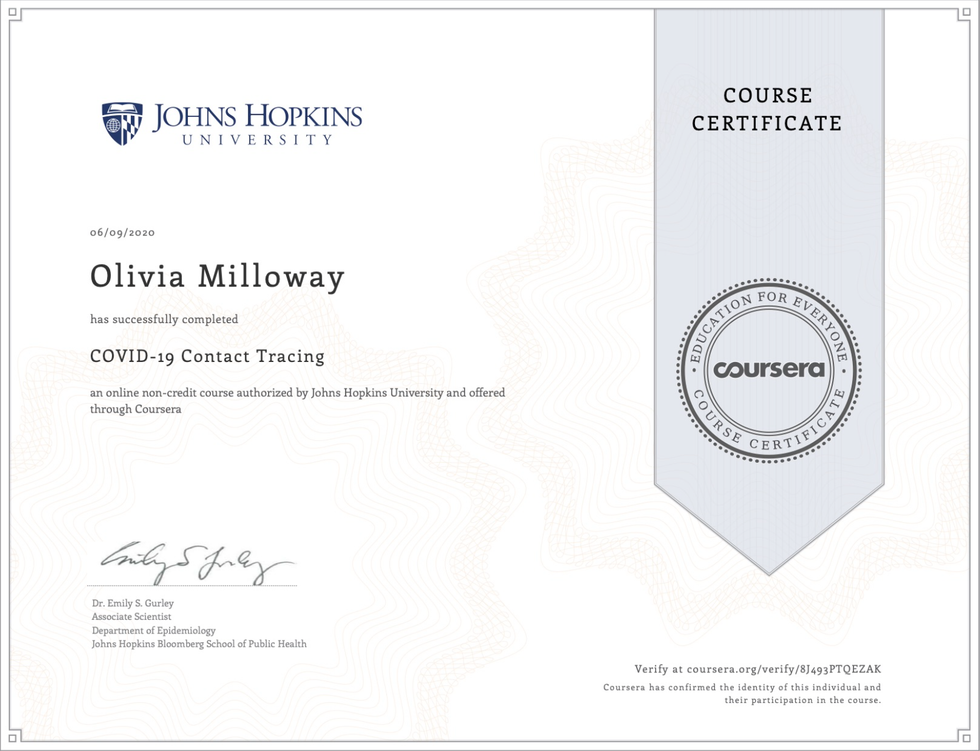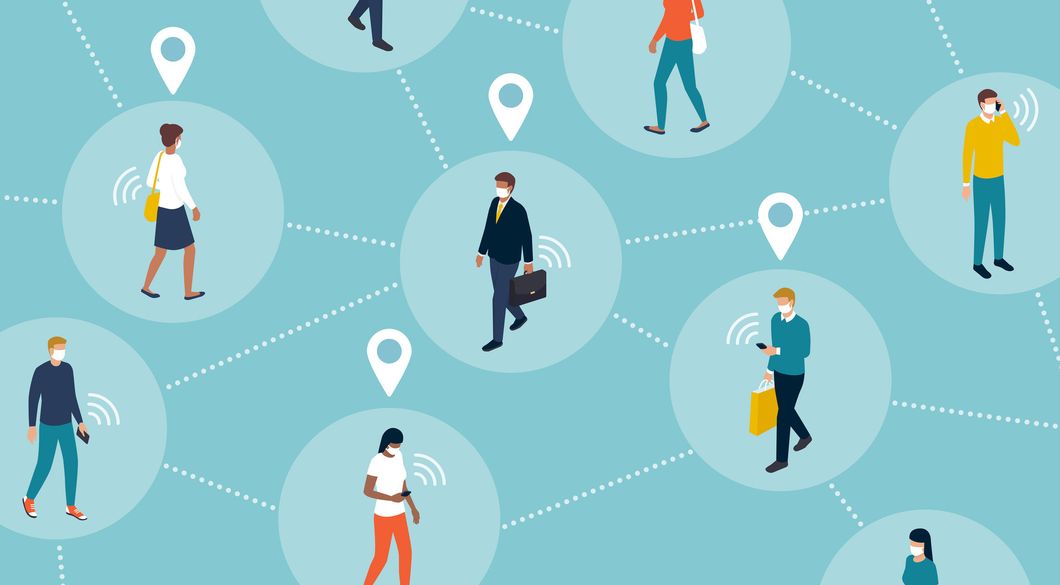As the country anxiously awaits the development of a vaccine, treatment, or other technological breakthrough to bring back life as we knew it, the tactic that ends the coronavirus pandemic might be a low-tech strategy used in many prior outbreaks. According to some experts in public health, contact tracing—or identifying individuals exposed to COVID-19 and preventing them from infecting others—is the key to stopping the coronavirus pandemic.
I knew little of the importance of contact tracers prior to reading an article in WIRED which states that the country needs at least 200,000 more contact tracers in order to effectively track and prevent the spread of the virus. Also mentioned in the piece was information on a free, online contact tracing course offered by Johns Hopkins Bloomberg School of Public Health. Since being sent home from campus where I worked in a global health lab investigating bat-borne infectious disease (ironic, no?) I've diligently tried to educate myself on disease prevention so I can best protect myself and others. Nevertheless, this is no simple task as we're constantly inundated with op-eds, podcasts, and talking heads with the latest predictions, opinions, and speculations on the single-stranded RNA virus that is dominating the globe. After being offered this new perspective on the importance of contact tracing, I decided to learn more about this effective public health strategy from a credible source and join the 390,607 people already enrolled.
The course, which is offered at no cost through Coursera, is taught by Emily Gurley, PhD, MPH, an Associate Scientist at the Department of Epidemiology at the Johns Hopkins Bloomberg School of Public Health. The class touts a 4.9 star rating with nearly 24,000 reviews and is currently offered in English but provides subtitles in Spanish, Portuguese, and Nepali (volunteer translators are currently working to adapt the course to more languages). Each of the five modules is broken up into short 2-20 minute videos followed by brief quizzes that require a passing grade yet allow for unlimited attempts. After a final exam which can be retaken, students receive a certificate of completion.

With beginner level content, flexible deadlines, and adjustable lecture speed, the class 5-6 hour course is accessible to students of all ages and easy to complete within a week. I learned critical information about the virus, how to identify high-risk situations, and what to do if myself or a loved one were to fall ill. Here are the reasons why I think everyone should take the course, too.
First of all, the course offers a deeper understanding of the virus, SARS-CoV-2, and the disease that it causes, COVID-19.
The first module teaches you the basics of the natural history and epidemiology of the virus, explaining what the risk factors are for infection, how the disease is transmitted, high-risk scenarios for transmission, and the different types of diagnostic tests that are currently available. This information is useful not only for contact tracers but also for any individual that wants to make informed, conscious decisions about entering public spaces, getting tested, and protecting yourself and your loved ones.
By the end of the course, you'll have a firm understanding of the process of contact tracing. Gurley explains the role of contact tracers as "detectives, investigators, social workers, and therapists."
Contact tracers have to be able to track down possible exposures, let them know of the risks they face, connect them with resources and information so they can quarantine for the duration of their infectious period, and offer emotional support in this stressful time. With this knowledge under your belt, you'll be better prepared to offer support and guidance in the event that you or a loved one were to fall ill. Your understanding of the process will also better prepare you to work with public health officials on the other end of the contact tracing process.
You'll learn about the ethics of contact tracing and the technological tools that are currently available.
During the fourth module, you'll learn about ethical issues such as privacy and confidentiality when dealing with public health crises. This lesson includes how public health officials, such as contact tracers, protect individual privacy when investigating the spread of COVID-19. With an understanding of how to balance the public good with personal autonomy, you'll be able to be an advocate for the process to others. You'll also learn about emerging technologies in contact tracing and what other countries are doing to combat the virus successfully, such as how South Korea is using apps to alert citizens of nearby COVID-19 cases.
There are nearly endless job openings for contact tracers.
California has turned to librarians and tax assessors to fill positions while they train contact tracers. Georgia is currently hiring contact tracers at $15 an hour. As unemployment rises and job opportunities are exclusively online, this training opportunity might open new doors to employment in a job that can be done from a distance. If you're an undergraduate interested in a health-related field, this is also a great opportunity for independent learning and professional development that might help with future internships or post-grad plans.
Finally, you'll learn skills for effective communication that extend well past contact tracing. The final module discusses tips for effective communication, such as how to build rapport, using different types of questions to yield accurate answers, and addressing complex problems.
You'll also be able to watch simulated conversations of interactions between contact tracers and individuals and observe how to offer compassion while delivering scary news and daunting instructions. You'll also be able to see how the actors communicate with people that are scared, angry, or in denial about the news that has just been delivered to them. All of these skills are useful for virtually every career, no matter what industry. One lesson is titled "Active Listening: Helping People Feel Heard," which is always a useful skill, not to mention during a time of global uncertainty when anxiety is on the rise.













